Crawling Back: Amazing Spider-Man #267 Review
Peter David produces one of the funniest Spider-Man stories to date with a standalone filler issue capitalizing on situational irony
—by Nathan on September 14, 2025—
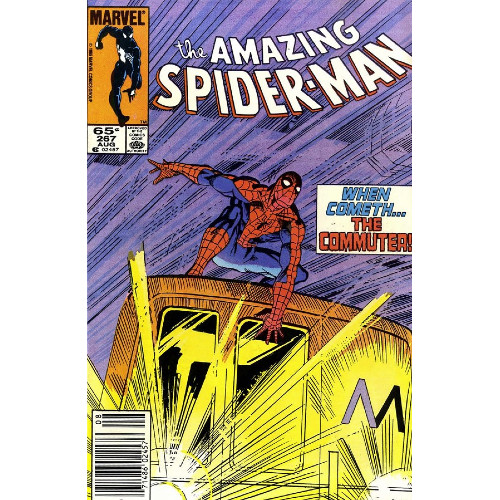
I recently reviewed a Spider-Man 2099 issue where Miguel O'Hara, right after defeating the Vulture in Nueva York's "Downtown," found himself stymied in his efforts to get home from that adventure. He was nearly run down by a car, almost caught by the cops, discovered that several religious folks were cosplaying him…y'know, the kinds of trouble anyone might find trying to get home after a long day.
The Peter David-penned issue reminded me of another narrative David wrote, this one during the mid-80s in Amazing Spider-Man. Published shortly after the "Alien Costume Saga" wrapped up, this standalone story remained ingrained in my mind shortly after reading it over a decade ago…and not because it was the most in-depth or thematic narrative. The issues tells a relatively simple story, but it possesses one of the great hallmarks of the late Peter David's storytelling techniques: it's funny, really funny, and remains memorable as a result.
I've often wondered when I'd get a chance to review this issue and occasionally regretted not sliding it into my post-"Alien Costume" blogs. Since Miguel's misadventure brought the story to mind, I felt it was only right to finally give this issue the opportunity to find its own way home.
"The Commuter Cometh"
Writer: Peter David
Penciler: Bob McLeod
Inker: Bob McLeod
Colorist: Bob Sharen
Letterer: Joe Rosen
Issue: Amazing Spider-Man #267
Issue Publication Date: August 1985
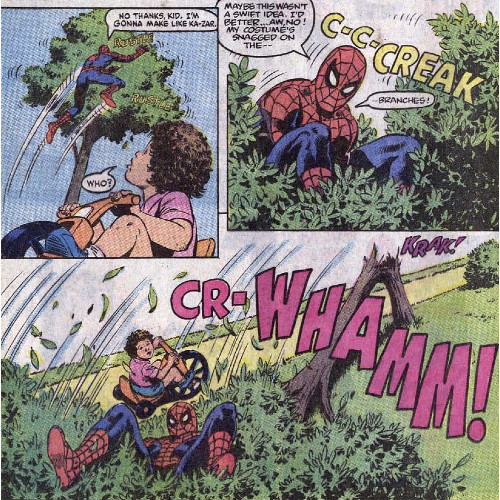
If you're still unaware by now (and I don't see why you would be), spiders possess the capability to scale surfaces, an ability which was duplicated in young Peter Parker when his genetics collided with the DNA of an arachnid. Yet, even with this incredible power, Peter's wall-crawling is dependent on one other factor: walls. In the Big Apple, this poses very few issues. Peter can scale a skyscraper and fire off a web-line to go swinging through the city at his leisure.
He learns, in this issue, how few skyscrapers there are in the suburbs. None, actually, to his chagrin.
The humor of this issue relies heavily on its "fish out of water" context, that Peter is so used to operating in the city as Spider-Man that he's bamboozled when his skills and abilities translate differently to the fringes of New York. The idea isn't bulletproof: Peter does frequent Forest Hills in Queens enough, having grown up there and frequently visiting his Aunt May, that you'd assume enough familiarity with the surroundings and suburbia's impact on his crawling. But we'll cut Mr. David some slack for that, simply because of how well the narrative operates.
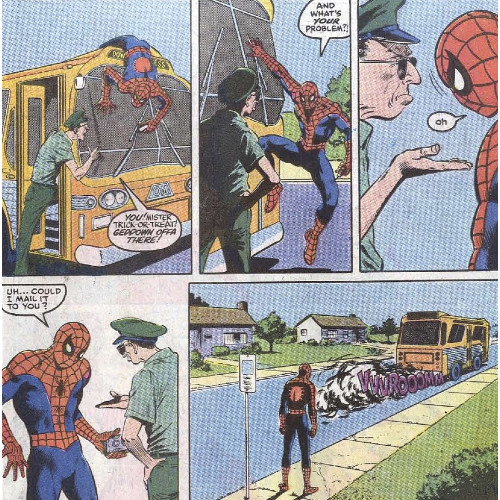
A good chunk of this issue takes place in the suburbs, where the real humor sets in as soon as Spidey arrives in this strange new world. Spidey is accosted on all fronts by different obstacles, from a snarling Doberman, to a self-important neighborhood watchman, to the police, to a snooty kid. He can't swing, he can't crawl, and he finds he's kinda clumsy without anything proper to climb. Oh, and he notes he forgot to bring his civilian clothes, so dude's gotta walk around the whole time as Spider-Man. It's one humorous bit after the other as this whole "comedy of errors" just surrounds and envelops him. We're given a full story, but readers may find the individual moments more memorable as our "fish out of water" (or "spider out of his web") navigates a space fairly foreign to his crime-fighting alter ego, his life in Forest Hills notwithstanding.
David was always a witty writer, in my mind, but much of his humor stems from clever turns of phrase and one-liners that zing like a bolt from Electro. Miguel O'Hara has his great moments of humor, and a few Wolverine issues David wrote in the 80s had great fun pairing the clawed Canadian with the Joe Fixit version of the Hulk. David applied great thought to his scripts, so even an issue like this one, a straight up humorous standalone adventure, feels well constructed, even if you're never going to find answers to life's greatest mysteries in its pages. What separates "The Commuter Cometh" from other stories David wrote, however, is its emphasis on situational humor–the dialogue is clever, but it's the positions Spidey finds himself in which draw, from me, the most amused reactions. Bob McLeod draws Spidey caught in a tree, tearing the back fender off a car, and completely whiffing with his web-line, creating great physical humor which matches, or maybe even outpaces, David's script.
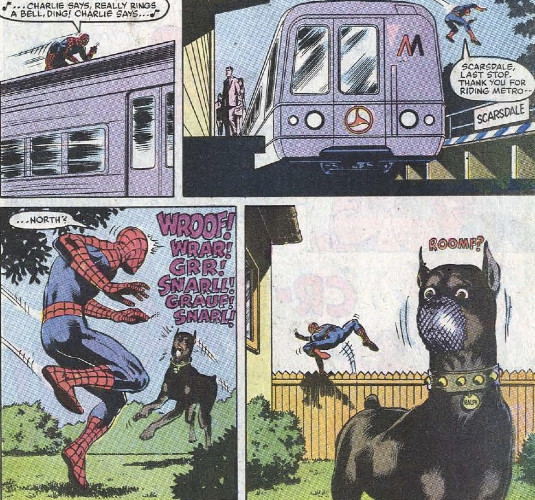
As I noted, there isn't much depth to this issue. We don't glean great insights from our main characters, neither Spidey nor the "commuter" himself, a punk crook named Ron chased by Spidey to the suburbs. The limited characterization we do find is in a few moments David and artist Bob McLeod use to juxtapose our characters: a scene switching back-and-forth between the men nicely contrasts their living conditions, Peter watching TV and going to bed by his lonesome while Ron has dinner with his wife. He's a crook, but hey, he's married, which feels like a step up from our boy Peter (this issue was published before, I'll note, his own marriage to MJ). Ron can sleep in, relax, take his time to do laundry, while Peter's up with the sun and swinging out to find our crook. The parallels feel, slightly, made at Peter's expense. He can't sleep in, he's not married…yet these moments also give Ron a false sense of security. Is it worth having the suburban house and the marriage if you have to spend your days looking over your shoulder because you're a thief? Even without the quaint happy life, Peter's a hero, making the right decisions. That should count for something more than checking the exterior boxes.
Why am I beating my brains out for a two-bit thief? Peter asks himself late in the issue, which is probably the narrative's most poignant moment. The question answers itself: because Peter has character. It's that old "responsibility" bit coming back to haunt him. Peter can't even let a "two-bit thief" go–David doesn't touch on it, but readers will surely remember what happened when Peter did let a small-time crook get away scot-free. Peter endures the humiliation, despite his own questioning and doubts, because he knows this is the right choice to make.
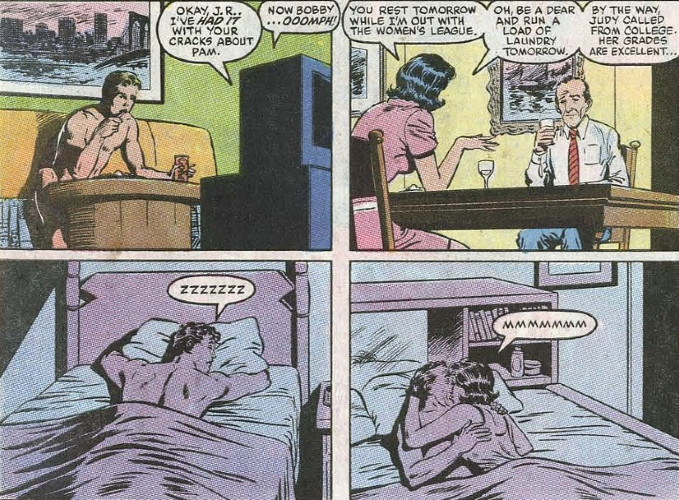
This is the kind of issue which couldn't happen to any other character. You would never see the Hulk lumbering around some cozy neighborhood looking for a crumb bum like Ron. Iron Man would probably just scan all the houses and tag the criminal. Daredevil could use his radar sense. And so on and so forth. Peter is the right guy for this kind of issue, driven by his sense of responsibility yet hampered by his own bad luck and his city-specific abilities.
At times, David does make our Web-Head come off as a little more naive than he should be. When Spidey first confronts Ron in the city, he's stymied by the criminal holding a "hostage" (in actuality, a clothing mannequin Ron threatens with a fancy lighter shaped like a gun). The gag goes on for a few pages, with Spidey hesitant to confront Ron because of the "hostage." Spidey even notes his lack of spider-sense and a lack of alarm from the "hostage," yet he's still duped. The scene, naturally, sets up the later suburb excursion and is necessary for the plot, but I felt like David resorted to having Spidey behave more foolishly than he normally would be.
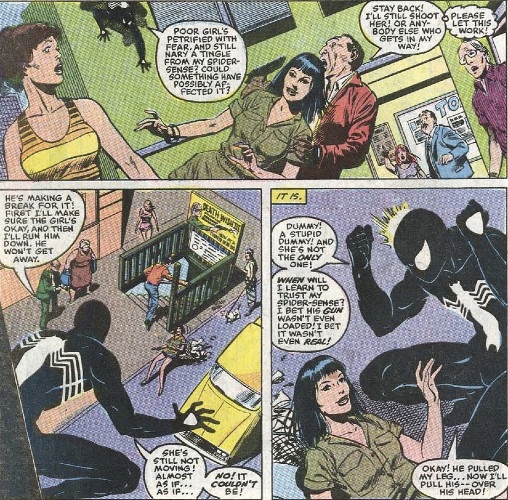
Aside from what I could call a bit of mischaracterization at the beginning, David handles this issue nicely. It's considered by many folks to be one of the funniest Spider-Man issues ever produced, and it's been lodged in my brain for that exact reason. Other writers are funny, sure (I'm thinking of Mark Waid, Joe Kelly, and Dan Sllott, though somewhat begrudgingly), but that humor is often relegated to the dialogue within the script. Here, as I mentioned, it's that circumstantial humor which makes the issue work so well, a blend between David's witty wording and McLeod's ability to translate humorous story beats. Bam, Spidey falls out of a tree in this panel. Wham, he leaves a confused pooch with a webbed-up snout in that panel. Boom, he fires a web-line at a non-existent skyscraper on that page. It's a moment-by-moment takedown of our beloved Web-Head (and, of course, given the character's classic "Parker Luck," he's the perfect patsy to encounter this scenario!), yet it simultaneously reinforces his dedication to the mission. And no suburban yuppies are gonna keep Spidey from getting his guy, be they bus driver, child, or neighborhood watchman.
Who watches that watchman, anyway?